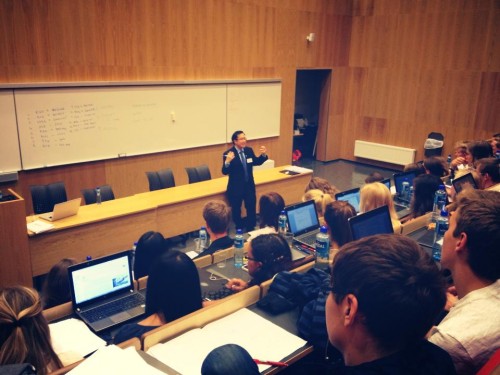
Meta learning: the rules around us define what we think of as success, and in Model UN the three different rules of procedure affect how delegates learn Model UN.
I spent my summer teaching at the various Best Delegate Model UN Summer Programs and the experience provided several insightful lessons into contemporary Model UN. I’d like to share my biggest takeaways for individual delegates, for groups of delegates, and for the global Model UN community.
1. Individual Lesson: Confidence can be built
I knew confidence could be developed in people because I went through that process as a Model UN delegate myself; I started off as a shy delegate who’d visibly shake in front of an audience but eventually became confident enough to introduce Ban Ki-moon in front of 2,400 people in the General Assembly. What I wanted to learn was how to replicate that development process in a compacted schedule.
The Best Delegate Model UN Summer Programs had a strong emphasis on leadership development and we had the students get real with each other. Students went through exercises that helped them learn about their personal strengths and weaknesses as well as emotionally intense exercises that helped them develop a stronger sense of self and community. The result was that almost 100% of students reported an increase in confidence on their post-camp surveys.
2. Group Lesson: Model UN has a bullying problem
I had many opportunities to observe delegate behavior inside and outside of committee during the Summer Programs, and what all of our staff realized was that bullying is common across all of Model UN. Oftentimes, students are not cognizant that they are bullying others — sometimes this behavior is even encouraged when they see Power Delegates be rewarded for being a bully and in some situations the students are merely emulating the behavior of family and friends.
Our Summer Program addressed bullying with lessons on social dynamics, gender roles, the difference between Power Delegates and Best Delegates, through group feedback, and with individual feedback including some stern talks with delegates. Students are often taught skills and substance, but Model UN seems to be lacking in education on negative behaviors and styles. I personally think the issue of addressing bullying — a problem that delegates across all camps globally can relate to — will become a bigger crusade of mine as I become a better teacher of social dynamics and leadership in the future.
3. Global Lesson: Meta Learning through Rules of Procedure
We ran our Summer Programs using three different rules of procedure: North American procedure for all US-based camps, THIMUN procedure for most international camps, and United Nations procedure (newly rolled out by the UNDPI’s UN4MUN initiative) at the WFUNA Youth Camp Korea. Now that I have had a chance to directly compare and contrast the different rules of procedure, I have realized that the rules affect meta learning — how students learn to what to learn in Model UN. In other words, the different rules of procedure that we grow up in teach us different definitions of success in Model UN.
For example:
- North American procedure is mostly a negotiation game through unmoderated and moderated caucuses until a group of sponsors reach a 51% vote.
- THIMUN procedure emphasizes debate on the quality of solutions as delegates spend most of their committee time amending resolutions until a 51% vote.
- United Nations procedure focuses on building consensus through Informal Meetings until one resolution can be adopted by all countries with 100% non-disagreement (voting is frequently not necessary when consensus has been reached).
We’ll be presenting more about Meta Learning at the Qatar Leadership Conference. Practically, we’ll also continue to provide training in the two dominant rules of procedure as well as the new UN rules of procedure for organizations and conferences that wish to simulate the UN accurately. I personally think that each procedure teaches different valuable skills and that the best delegates should experience each one for a well-rounded Model UN education.

